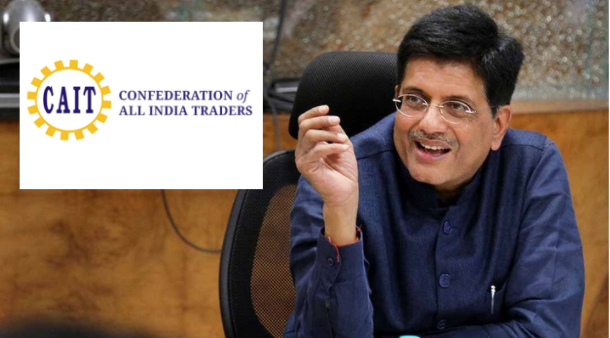Confederation of All India Traders, the apex body of Indian traders, has urged the Minister of Commerce and Industry, Piyush Goyal, to include direct selling in the domain of the ministry. “We are of the considered opinion that direct selling is an integral part of retail trade like other verticals including big retail, small retail, e-commerce and self-employed groups,” said CAIT in a letter to the Minister.
Currently, direct selling is under the Ministry of Consumer Affairs, Food and Public Distribution’s Department of Consumer Affairs. While all other types of internal and external trade are dealt by the Ministry of Commerce, direct selling, which constitutes the largest part of internal trade and involves hundreds of MSME units, is under a different ministry.
Given the fact that the country has a separate ministry to deal with external and internal trade and its officials specialize in that segment, there is no need to dedicate a separate department in a different ministry to deal with the same. Therefore, the CAIT urged the minister to “take a pragmatic view and accept their request for bringing direct selling business under the domain of the commerce ministry”.
Direct selling is an integral part of India’s supply chain and traders face several issues as they have to deal with a separate ministry while the majority of the players of that supply chain deal with a different ministry. Therefore, bringing direct selling under the trade and commerce ministry would integrate the supply chain.
CAIT, a nationalist body of traders, is at the forefront of the Indian government’s boycott China moment and has brought Chinese companies to their knees since the Galwan valley clash which led to the death of 20 Indian soldiers.
In June, when the India-China border clash heightened due to continued Chinese aggression, CAIT, the apex body of the traders’ union which represents 4,000 traders’ bodies and more than 7 crore traders across the country, had decided to boycott Chinese goods worth more than 1 lakh crore rupees– 13 billion dollars approximately– by December 2021. CAIT has already prepared a list of 3,000 items which includes toys, gifts, FMCG products, confectionery products, clothes and watches, as superior indigenously manufactured alternatives of these items are available.
In the last four months, CAIT has become the leader of the boycott China movement by ensuring that not a single Chinese product is imported during festivals. Two big festivals- Raksha Bandhan and Ganesh Chaturthi passed since June and neither Chinese Rakhis nor Ganesh idols imported from China saw the light of the day in India. And now, India is preparing for a Chinese product free festival season which has started with Navaratri and will end with Diwali.
India imported goods and services worth 65.26 billion dollars from China in FY 20 while the total trade volume stood at 81.6 billion dollars, registering a trade deficit of 48.66 billion dollars. This was even though the Modi government increased custom on many Chinese goods like steel, toys, scooters, and tricycles.
But, this time, the trade deficit with China dipped significantly in the last six months, especially after June; thanks to coordinated efforts of CAIT and the Ministry of Commerce and Industry. In the first nine months of this calendar year, trade between China and India slid 10.9 per cent year-on-year, with China’s exports to India down 17.7 per cent and imports from India up 17.7 per cent.
The trade & commerce ministry and CAIT are already coordinating on many fronts in order to kick China out of India’s supply chain. Trading has nothing to do with the Ministry of Food and Public distribution in a free market economy. It is a legacy of the socialist economy when goods reached consumers through public distribution rather than free markets. The economy has come out of the clutches of socialism and the government needs to shed its socialist hangover with the transfer of Direct selling jurisdiction from the Ministry of Food and Public Distribution to Ministry of Commerce and Industry.
